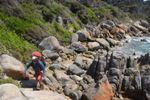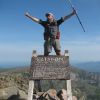Pike River Mine New zealand
a few years ago a methane gas explosion ripped through this mine, there were a couple of dozen people in the mine at the time,
two got out alive,,
due to the extreme dangers of further gas explosions, search and rescue teams weren't allowed in to try and rescue.
as time went on it was aparent methane levels were rising in the mine again.
search and rescue were never able to re enter the mine
all along the families of the people left in the mine were pleading for a rescue, eventually they accepted all the miners were dead after a second and larger explosion ripped through the mine
after the second explosion the families of the dead miners kept pleasing for a recovery operation
there were still massive safety issues about re entering the mine. the mining company went bankrupt and couldnt afford to stabilise the mine and recover the bodies safely. the mine has since been sold. it still hasnt been financially pracivcal to make the mine safe enough to re enter it.
still the families demand the recovery of the bodies and criticise the delays
so you can have some extreme situations in search and rescue operations,
families and friends desperate for the recovery of loved ones,
the location and recovery of those loved ones can put others safety and even lives at risk...
I was involved in recovering a severely concused adult male from a canyon.. it had to be done on foot.
we were SAR training and one of the team members was genuinely concussed when someone fell on top of him climbing a rock face ,and he fell hitting his head on rocks.
all the sar teams involved in the exercise were required to extract him. all two dozen of us... it took all teams several hours to get to him, even though we were all within a few kilometres of his location.
then for three hours we strugged with the stretcher man handling it down the canyon stream, always on rough and uneven ground, also having to go back and retrieve our full overnight packs we'd dropped every time we came off the stretcher... ten minutes on the stretcher and you would feel absolutely spent, even with eight to ten people on the stretcher at a time,, someone else would take over ,and you'd have to recover then catch up and carry the stretcher again, one rescuer was injured and couldnt keep carrying the stretcher, we were all bashed and bruised and exhausted after a three hours stretcher carry.
it was by far the hardest three hours of my life. i used to be a competitive athlete and it was far harder than any training or competition i'd been in,
search and rescue controllers have completely conflicting priorities. save or recover people from often rough terrain when there is inhospitable weather , and at the same time safeguard the safety and well being of the searchers.
they can come under immense private and public pressure to recover people or bodies and they must remain objective about the likelihood of successfully doing so without putting searchers at undue risk to their own health and safety
not long ago a rescue helicopter crewman lost his life rescuing a stranded bushwalker on a vertical slope.
if anything search and rescue dont overplay the risks involved to themselves. my experiencd of SAR workers is they underplay the risks, and they are often willing to take risks to effect rescues, if anything its the rescue controller that will hold them back from taking excessive risks... search and rescuers can get very emotionally tied up in what they are doing as well..
its a tribute to the skills of search and rescue organisations that there arent a lot more injuries or even deaths in search and rescue operations. It's easy to forget the danger they repeatedly put themselves in, often there can be a lot of minor injuries from SAR operations. but you won't hear about it, lots of cuts and scrapes and bruises even broken bones on occasion.. but SAR don't publicly list the details of searchers injuries.... so it gets lost in the media what the searchers are putting themselves through, long long hours of physically arduous and or tedious work, heat, cold, exhaustion, injury, stress, boredom. weakness. plus all the emotions and thoughts that can run through your head while carrying out such a demanding task...
yes there are some pretty fit and experienced people involved in sar but they are not super humans.
they put their lives on hold to help others repeatedly, often for no financial reward .
and then there are the searchers families and friends who worry about the searchers themselves.
its easy to sit in judgment of search and rescue when they can't recover missing people and when they call a halt to the search.
its easy to forget the dangers involved until something serious goes wrong....
there is often more lives at risk than the people who the SAR operation is for
unlike pike river mine a lot of search and rescue operations can cover vast areas. as searches go on and the area of the search may have to widen... the amount of work that may be involved to continue searching every widening areas in situations where you are likely to eventually be searching fora body or bodies can become very large and very expensive and ther can still be no guarantee you can recover the body, the time of year can make searching and likelihood of finding the missing exponentially harder,
this all has to get weighed up by SAR controllers,, they simply can't sanction endless searches, they have finite resources available to them, they have to conduct multiple searches over time, you cannot leave resources involved in one search beyond certain periods of time, the staff involved become exhausted, they need time to rest and recover and eventually be called on for future rescues... how long can you call on volunteers to keep searching with all that is involved for them with the search? back home they often have loved ones that need them, bills start piling up , they need to go back to earning a living, they often have employers who have allowed them time off to search and they need those people back to run their business effectively. life goes on and all considerations have to be weighed up objectively on how long a search will last and when to call it off..
imagine how hard it is for the searchers to have to stop searching when they know there are so many people so heavily emotionally involved in the search with very strong desires to recover the missing.....
it has to be weighed up objectively at what point in time is the likelihood of the ones you are searching for are no longer going to be alive, how much resources can you keep putting into searching for a body? how much risk can you keep placing the searchers in looking for a body?
people talk about the ability to live off the land,
well in NZ it's recognised as having rain forests with some of the least amount of edible plants in it...
bear grylls caught a possum on the ground in nz in daylight. well i've never seen a possum in daylight only when it's pitch black..
you would have to be pretty familiar with where to find the limited amount of edible plants and insects.... and be lucky enough to be somewhere where you can actually find them in enough volume to stay alive let alone stay healthy...
there comes a time when it must feel like you're damned if you do and you're damned if you don't keep searching....
I don't have a death wish, but personally I dont have an issue if i should die in the wilderness of being left out there. lost forever... its not a totally unlikely situation given that I bushwalk regularly. although i havent walked off trail for years, i could still get lost and die off trail... I accept that, I hope those I know can accept that too and that the wilderness may be my final resting place, at least they don't have to go to the trouble of scattering my ashes in the middle of nowhere....
Objectiveness in Search and rescue Operations
Forum rules
The place for bushwalking topics that are not location specific.
The place for bushwalking topics that are not location specific.
8 posts
• Page 1 of 1
Objectiveness in Search and rescue Operations
Last edited by wayno on Thu 20 Jun, 2013 7:40 am, edited 2 times in total.
from the land of the long white clouds...
-

wayno - Lagarostrobos franklinii

- Posts: 8685
- Joined: Sun 19 Jun, 2011 7:26 am
- Location: NZ
- Region: New Zealand
- Gender: Male
Re: Objectiveness in Search and rescue Operations
I haven't anything personal to add to wayno's excellent post, beyond +1 on the difficulty of carrying a stretcher (even in training) and the romance of disappearing into the wilderness like Voss.
However, here's an example of a bunch of Canadian SAR people who (it seems) were tasked to recover a body and a car, and who lost a member when it went pear-shaped: http://www.nelsonstar.com/news/180558321.html
The real underlying issue is starkly presented by this case: why would you risk warm happy living people to recover a corpse and a car? In retrospect, of course, you wouldn't. The hard responsibility is to recognise that prospectively, and call off a search when the futility is apparent.
However, here's an example of a bunch of Canadian SAR people who (it seems) were tasked to recover a body and a car, and who lost a member when it went pear-shaped: http://www.nelsonstar.com/news/180558321.html
The real underlying issue is starkly presented by this case: why would you risk warm happy living people to recover a corpse and a car? In retrospect, of course, you wouldn't. The hard responsibility is to recognise that prospectively, and call off a search when the futility is apparent.
sig pending approval
-

colinm - Athrotaxis cupressoides

- Posts: 388
- Joined: Wed 27 Jul, 2011 10:39 am
- Region: New South Wales
- Gender: Male
Re: Objectiveness in Search and rescue Operations
Excellent post Wayno. I have helped carry a stretcher in training and it is *&%$#! hard work, even over a fairly short distance. Recovering bodies is fine when the level of risk is acceptable, but unnecessarily risking lives to do so is irresponsible, no matter what emotional pressure may be placed on the recovery personnel by the victims friends and family. The Pike River incident is an example of correct risk assessment in spite of the emotional pressure from the families of the victims. I'm sure the dead miners themselves would understand and not want their comrades to risk themselves unnecessarily.
-

Lindsay - Phyllocladus aspleniifolius

- Posts: 679
- Joined: Thu 01 Oct, 2009 3:00 pm
- Location: Sydney
- Region: New South Wales
- Gender: Male
Re: Objectiveness in Search and rescue Operations
Yes totally agree it is a difficult call some times, last week at work we did rescue training and lowered a stretcher and dummy down from the 20th floor to the 16th floor through the centre of the stair well. Way easier to do than man handle, as we had to do several years ago (with a real person) we needed about ten people to get them down only 1.5 floors and very exhausting.
How any one can be expected to transport a patient for 5 kms through bush and up or down hilly terrain with only 4 or 5 people would be beyond most fit people.
As to going down a mine which has an explosive atmosphere after it has already exploded twice would most certainly be increasing the number of deceased persons.
I do say that with utmost respect to the people involved with the Pike Creek mine and their families.
Marty.
How any one can be expected to transport a patient for 5 kms through bush and up or down hilly terrain with only 4 or 5 people would be beyond most fit people.
As to going down a mine which has an explosive atmosphere after it has already exploded twice would most certainly be increasing the number of deceased persons.
I do say that with utmost respect to the people involved with the Pike Creek mine and their families.
Marty.
-

MartyGwynne - Athrotaxis cupressoides

- Posts: 339
- Joined: Sun 30 Jan, 2011 4:31 am
- Region: Victoria
- Gender: Male
Re: Objectiveness in Search and rescue Operations
Early this year (or was it late last year - the memory is going) I was involved in a stretcher carry from 3/4 of the way up St Patricks Head to the bottom, not far but it took us 3-4 hours with approximately 10 people, the patient need to be heavily medicated so that she didnt feel the bumps etc. Stretcher carrying is very hard work. When on slopes, Padddys Head is pretty steep, it is fairly risky for the the bearers too. Alot of the way the stretcher was just slid along the ground, as it was too hard/risky for the bearers to actually walk and carry the stretcher. This is on a track, would hate to have to do it through scrub for any distance.
Roger
Roger
-

norts - Lagarostrobos franklinii

- Posts: 2005
- Joined: Wed 01 Aug, 2007 10:45 am
- Location: Germantown Tas.
- Region: Tasmania
Re: Objectiveness in Search and rescue Operations
yup forget the gym. stretcher carrying will give you that all over body workout at a level of intensity you didnt know existed, it took me weeks to get over my stretcher carry.... i remember i had to go back to work the following day, i was grumpy the boss had a go at me in front of everyone, i was pretty shattered and feeling fragile already from the massive effort the day before, i just burst into tears. i was pretty fit, but that experience still took it out of me
from the land of the long white clouds...
-

wayno - Lagarostrobos franklinii

- Posts: 8685
- Joined: Sun 19 Jun, 2011 7:26 am
- Location: NZ
- Region: New Zealand
- Gender: Male
Re: Objectiveness in Search and rescue Operations
wayno wrote:.....search and rescue controllers have completely conflicting priorities. save or recover people from often rough terrain when there is inhospitable weather , and at the same time safeguard the safety and well being of the searchers.
they can come under immense private and public pressure to recover people or bodies and they must remain objective about the likelihood of successfully doing so without putting searchers at undue risk to their own health and safety.....
Easy to forget the danger they repeatedly put themselves in, often there can be a lot of minor injuries from SAR operations. but you won't hear about it, lots of cuts and scrapes and bruises even broken bones on occasion.. but SAR don't publicly list the details of searchers injuries.... so it gets lost in the media what the searchers are putting themselves through, long long hours of physically arduous and or tedious work, heat, cold, exhaustion, injury, stress, boredom. weakness. plus all the emotions and thoughts that can run through your head while carrying out such a demanding task...
yes there are some pretty fit and experienced people involved in sar but they are not super humans.
they put their lives on hold to help others repeatedly, often for no financial reward .
and then there are the searchers families and friends who worry about the searchers themselves.
its easy to sit in judgment of search and rescue when they can't recover missing people and when they call a halt to the search.
its easy to forget the dangers involved until something serious goes wrong....
there is often more lives at risk than the people who the SAR operation is for
Very pertinent post Wayno. Thanks for your thoughts.
It's pretty well summed up by this phrase from another experienced volunteer SAR person
"You know the other secret about being a SAR person? Most of the first aid and rescue training we do is for ourselves. Sure we do first aid and practice rescue, packaging and transport, but a large portion of our training is designed to keep our own team members safe. The motto, which any SAR person will tell you, is Self, Team, Bystanders, Subject. That’s the priority"
(taken from http://blog.oplopanax.ca/2013/06/on-pos ... urce=pubv1)
I have the utmost respect for SAR personnel, and publically give my thanks and appreciation for all they do.
Hopefully I'll never need their services.....
We can learn a lot from crayons. They come in different shapes and colours, but they all have to live in the same box
-

Onestepmore - Athrotaxis selaginoides

- Posts: 1305
- Joined: Mon 02 Jul, 2012 11:33 am
- Location: Picton
- Region: New South Wales
- Gender: Female
Re: Objectiveness in Search and rescue Operations
wayno wrote:Pike River Mine New zealand
still the families demand the recovery of the bodies and criticise the delays
Yes, my nephew's body remains in that mine and my sister (his mother) is very unhappy about the chain of events.
But, to be frank, other lives would've been placed at serious risk had they attempted a rescue.
It's always difficult to balance emotions with other things, and most times no one really wins.
-

roysta - Phyllocladus aspleniifolius

- Posts: 674
- Joined: Mon 22 Dec, 2008 8:14 am
- Location: New South Wales
- Region: New South Wales
- Gender: Male
8 posts
• Page 1 of 1
Return to Bushwalking Discussion
Who is online
Users browsing this forum: No registered users and 10 guests
